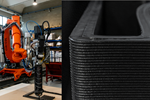Dahltram I-350CF qualified through JuggerBot 3D Material Card suite
The collaboration focuses on developing parameters for repeatable and reliable pellet-fed 3D printing using the carbon fiber-reinforced high-temperature tooling resin.
Share
Read Next
Wing section (left) and curved composite tooling (right) using Dahltram I-350CF. Source | WSU MARS Center
Industrial 3D printer OEM JuggerBot 3D’s (Youngstown, Ohio, U.S.) announces the addition of Airtech Advanced Materials Group’s (Huntington Beach, Calif., U.S.) Dahltram I-350CF, a 20% carbon fiber-reinforced polyetherimide (PEI), to the company’s Tradesman Series P3-44 Material Card suite.
Airtech, specializing in additive manufacturing (AM) materials, offers an
expansive portfolio of thermoplastics. 3D printed tools and end-use parts aim to contribute to increased efficiency, flexibility and aerodynamics during use.
The Material Card is moving to the apex of high-performance thermoplastics, with Dahltram I-350CF being the newest addition for JuggerBot 3D users. According to the company, the digital suite addresses skills gaps and streamlines operation, leveraging findings from material testing to fuel
data-driven process control. Material Cards also provide critical safety and material properties for 3D printed parts, helping engineers and designers better predict performance of printed items. Ultimately, the I-350CF Material Card and collaboration with Airtech enhances JuggerBot’s user’s ability to deliver high-quality tooling and parts that are critical to customers when using its Tradesman Series P3-44 system.
The P3-44, known for its robust construction and capability, is designed to handle large-format printing of a wide range of performance thermoplastics. It features a heated build chamber, precision control systems and calibration processes.
Airtech’s screening process for the qualification of Dahltram parameters on the large-format pellet system establishes baseline mechanical and physical properties such as tensile strength/modulus, elongation at break, flexural strength/modulus, coefficient of thermal expansion, glass transition
temperature and more. Coupling this rigorous testing process with JuggerBot 3D’s Material Testing & Assessment procedure, large areas of process parameters are defined for the successful repeatability and reliability of each print.
Weber State University’s Miller Advanced Research and Solutions (MARS) Center, a Utah-based composites center with the goal to address industry deficiencies in high-temperature composites supporting hypersonic vehicles, rocket motors, and other energy and space applications, are said to have been the first users of the Dahltram I-350CF Material Card (read “MARS Center grows LFAM capabilities with JuggerBot 3D Tradesman Series”).
“As soon as we started running PEI, it became very clear why the Material
Card exists,” says MARS Center research technical lead Derek King. “It’s the best way to build.”
Related Content
-
TU Munich develops cuboidal conformable tanks using carbon fiber composites for increased hydrogen storage
Flat tank enabling standard platform for BEV and FCEV uses thermoplastic and thermoset composites, overwrapped skeleton design in pursuit of 25% more H2 storage.
-
ASCEND program update: Designing next-gen, high-rate auto and aerospace composites
GKN Aerospace, McLaren Automotive and U.K.-based partners share goals and progress aiming at high-rate, Industry 4.0-enabled, sustainable materials and processes.
-
Cryo-compressed hydrogen, the best solution for storage and refueling stations?
Cryomotive’s CRYOGAS solution claims the highest storage density, lowest refueling cost and widest operating range without H2 losses while using one-fifth the carbon fiber required in compressed gas tanks.


















